Sports are always about the whole team, whether on the field or at the corporate level.
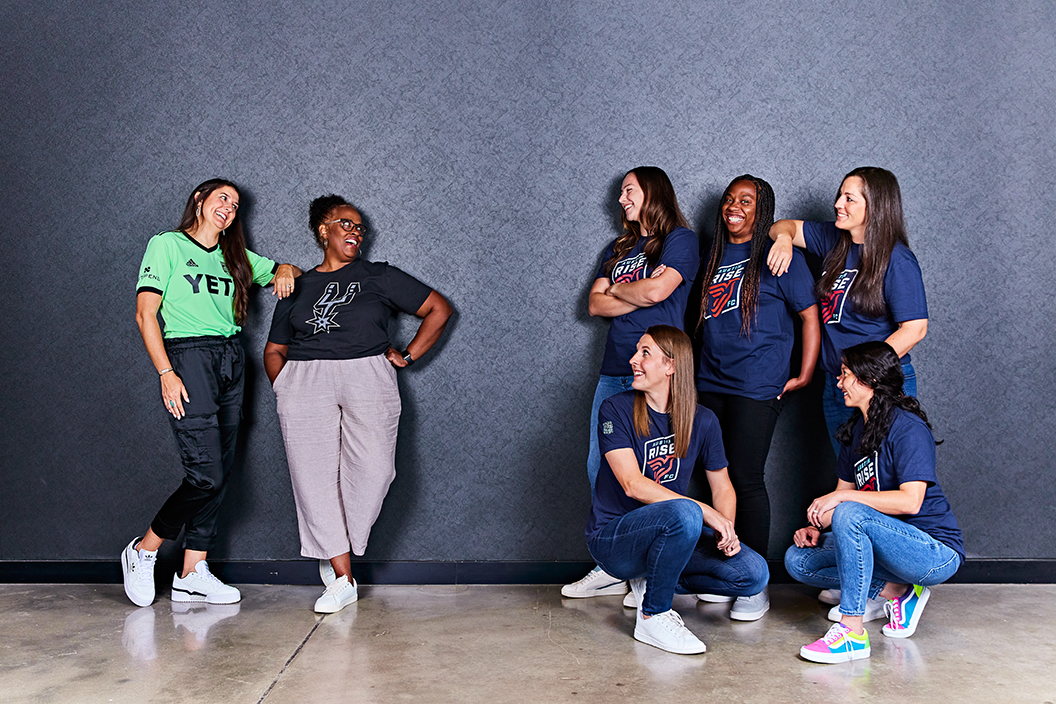
By Jenny Hoff and Cy White. Photos by Annie Ray. Styling for Alison Roscoe: Jewelry by Kendra Scott; Clothes by Estilo. Hair by Michael Dunn of Deco Blue Salon. Makeup by Adela Touvell of Kiss N’ Makeup. Shot on location at the Q2 Stadium.
The Women Behind Your Favorite Sports Teams
By Jenny Hoff
Building partnerships makes sports a reality.
Giving an Idea a Name
Just a few years ago, Austin had no major league sports team, no soccer stadium, no immediately distinguishable team colors other than burnt orange.
Today, it seems like the Q2 stadium and the verde jerseys have always been a part of Austin’s fabric.
That’s due in no small part to Alison Roscoe, senior vice president of corporate partnerships for Austin FC, who took the job in 2019, when this was all just an idea, and helped it become a reality. Q2 is a digital banking platform with more than 20 million users and in a tech hub like Austin, is a familiar name and industry, representing what the city is becoming. On each green jersey, the Yeti logo stands out, a cult brand for sports and outdoors enthusiasts, born and headquartered in Austin.
“Working in sports, to say you were part of building a professional sports team and building a brand-new stadium in a city like Austin is pretty cool,” says Roscoe. “To be there from the ground up is amazing.”
A soccer enthusiast and former player herself, Roscoe moved to Austin in 2019, unable to resist the opportunity to help create a legacy like Austin’s first major sports team. With a planned opening date of early summer 2021, she had her work cut out for her, finding the right sponsors and building both corporate and community relationships.
“Working in sports in general is long hours; it’s seven days a week,” she says. “Leading into opening the building, it was busy. Are we going to hit deadlines, have the name of Q2 up in time? But I get to look back and see I did this.”
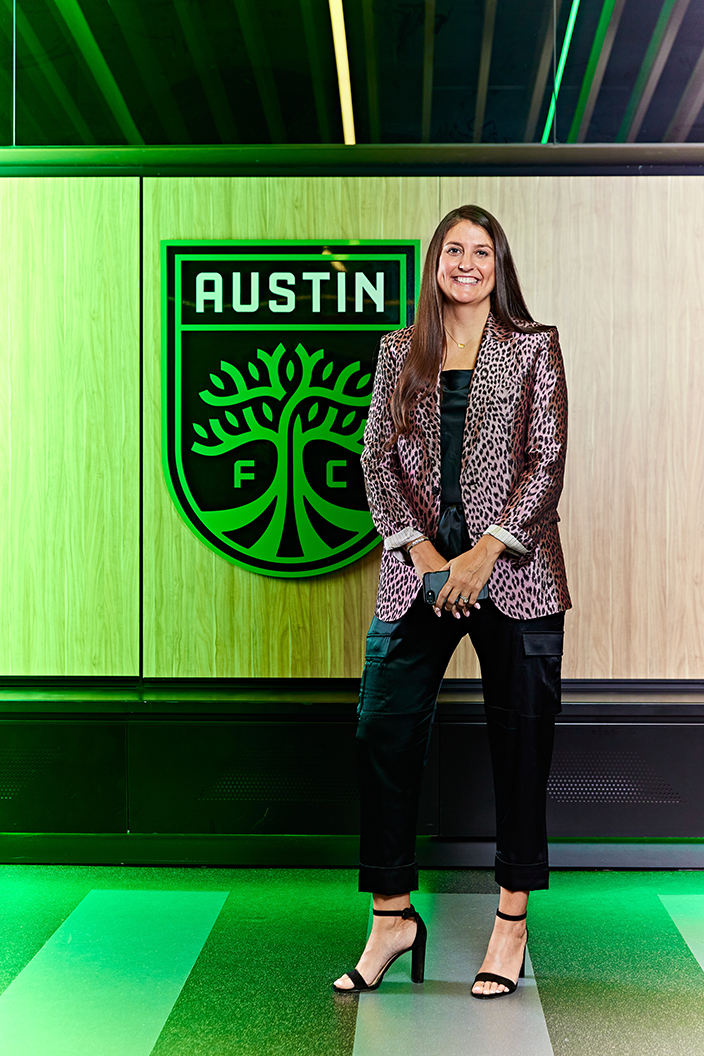
And she did this while also navigating a global pandemic and becoming a first-time mom. Six weeks after she and her husband, Philip, found out she was pregnant, the world shut down due to Covid-19. While it threw the world into a tailspin, it also gave Alison a chance to work from home and focus on not just birthing a major league sports team, but also her now 2.5-year-old son, Easton.
Today, you’ll see Easton sporting his favorite Austin FC jersey, wearing his own credential and cheering the team on. Part of Roscoe’s job is working every game, and that means Easton gets to visit mommy’s work often. She says she’s never experienced anything but support from the organization.
“Easton comes to games with me, he comes to the office, and it’s accepted,” she says. “It’s showing other women in the industry it can be done. It’s hard; it’s hard as hell. But you can do it.”
The very first game played on the field of Q2 stadium didn’t involve Austin FC or male soccer players at all. The U.S. national women’s soccer team took the field, packing the stadium and beating Nigeria 2-0. Alison says it was a proud moment to watch her soccer idols inaugurate the stadium she had worked so hard to bring to fruition.
Standing in the Q2 arena as players face off in the world’s most popular sport, the excitement is palpable. A sea of green, flags waving in the air, children and adults all coming together to cheer on what has become an inextricable part of the Austin fabric. For Roscoe, it’s those moments that remind her that what she has helped create is important and lasting.
“For me, it’s a continued sense of community,” she says. “It’s the generational excitement. It’s my son continuing to be a fan as he grows older and bringing his kids. To see that continue is very special. Hopefully we keep winning and bring championships.”
Building Bonds off the Field
Community is at the heart of Perri Travillion’s work. As Austin community investments senior manager, which is part of the impact team for Spurs Sports & Entertainment, she focuses on ensuring the sports organization’s goal of impacting the community even when the season is over.
“Our priorities are access, healing and belonging,” she says. “And we do the work both within and outside the organization.”
Travillion, a mom with two sons and a daughter, sees the unity that comes with sports as a model for the community at large, for the future her children are inheriting.
“When you walk through the door in a sports event, they don’t divide [you]into groups,” she says. “It doesn’t matter if you’re Democrat or Republican, woman or man. Once you’re in the arena, we just want our team to win. In that instance, we are more united than we are divided.”
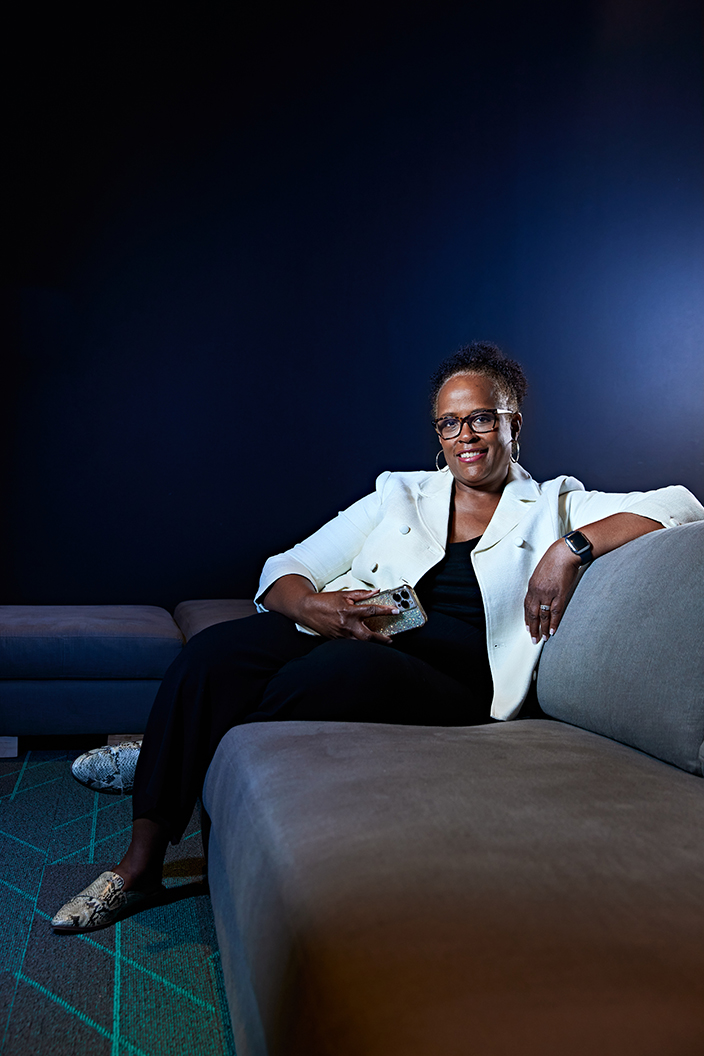
Every day, Travillion gets to see that narrative play out when she helps create opportunities for kids in underprivileged communities to get a new basketball court, or she gives them access to camps and clinics as well as educational opportunities.
Within the organization, her group also focuses on ensuring the mental and physical health of the athletes. Life happens to everyone, even sports stars, and creating a safe environment where they can help athletes overcome personal difficulties, as well as professional ones, is integral to the success and heart of the team.
“What stands out for me is that when you work in team sports, you become a family,” she says. “Your sports organization becomes an extension of your family. There are players from years ago that still text me for Mother’s Day. I know when they get married and have babies. That tells me what we’re doing is affecting the lives of players.”
When Travillion joined what was then the Austin Toros in 2005 (the name was changed to Austin Spurs in 2014), she didn’t realize just how much of a family the organization would become. Like Roscoe, her children grew up at the games, meeting players and getting inspired by the athletes in the area. She grew as well, learning to wear many hats, which is needed in a minor sports league. The organization grew, too. When she joined there were far fewer women in the industry. Eighteen years later, she’s proud to see the diversity of people who make the success and excitement of professional sports a reality.
“When I started in 2005, I didn’t walk around and see people who looked like me,” she says. “To see Cynthia Marshall [chief executive officer of the Dallas Mavericks]in a CEO position is fantastic. There are lots of women of color in many sports who have taken leadership roles. It makes my heart happy to see not only women, but women of color taking on those leadership positions.”
Changes in leadership are happening not just off the field, but on the field too. In 2019, the Austin Spurs was the first team in the NBA G League that had the first all-female officiating crew. “We squared our shoulders and had a different level of pride in that game,” recalls Travillion.
Seeing change within the organization as she works for change outside of it has given Travillion hope that progress is possible, and sometimes all it needs to start is a ball and a court.
“The more we tell the story of how easy it is to walk in the door of an arena and pull in the same direction, hopefully the more we’ll recognize it’s not that difficult to continue pulling in the same direction when we leave.”
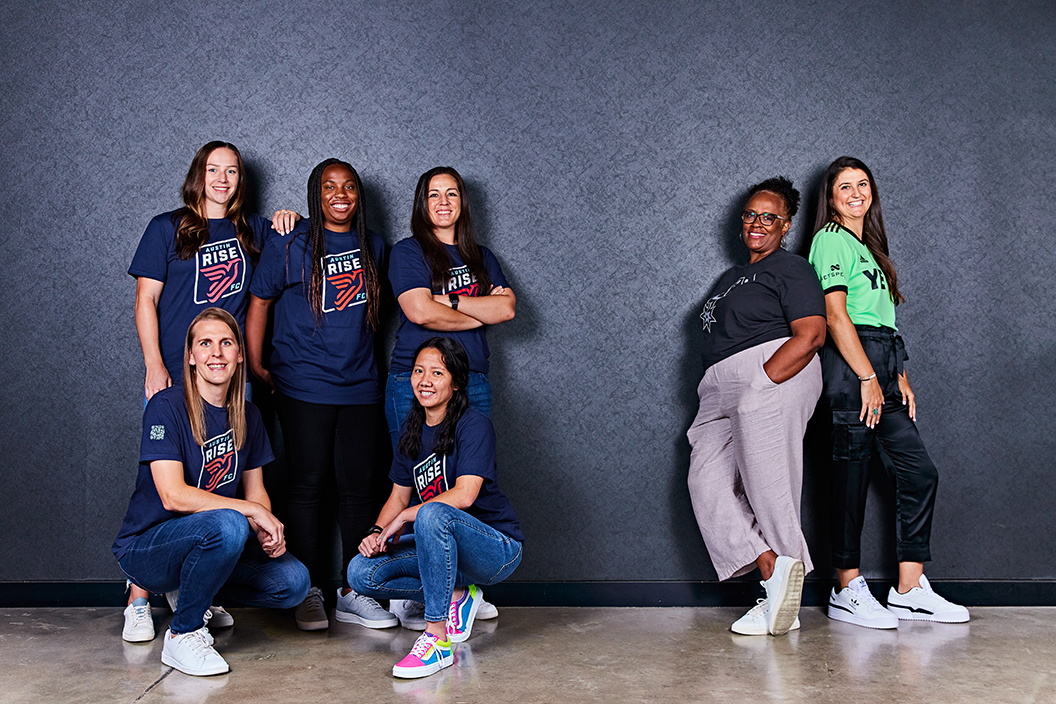
Rise As One
By Cy White
The women of Austin Rise FC have gone through the fire and emerged more passionate than ever.
The phoenix is a mythical creature. As one life cycle ends, the bird, proud in its bright red plumage, erupts into flame. A dramatic end to a dramatic life spanning across ages, lifetimes. Just as quickly as one cycle ends, however, another begins. From the ashes an elegant reincarnation lifts to the skies, feathers ablaze, spirit as restless and wild as the life lived before it. Though now a cliche, the myth nonetheless evokes a feeling of hope fostered by determination and the will to move forward.
The women who comprise Austin Rise FC, one of Austin’s few women’s semi-professional elite soccer team, took inspiration from this creature of lore, emblazoning not only their jerseys with the fire-red emblem, but deriving much of the inspiration for their name from that same inferno-laden beast.
“One of the first things that we did actually do, besides making the decision to start putting together [a team], was think about what that name was going to be to represent us,” says Katie Reed, the team’s marketing and branding lead. “We went through a number of different names. I think we ultimately landed on ‘Rise.’ It became one of the top runners right away. Something that was super important to us was it needed to be catchy and easy for the town to remember. But it needed to represent who we were and who we can, where we came from. The word ‘rise’ is representative of our story, of where we came from.
“Coming from a situation that was honestly just horrible, Austin women’s soccer was left without an opportunity for high-level play,” she continues. “It was no fault of our own. So being able to take that situation and turn it into something really positive and, so to speak, rise out of it, was pretty cool. To incorporate that into our name in a way that was kind of literal. But also it’s so much more than that, was kind of cool for us. It has a bit of a limitless future for us as well.”
It’s About the Future
Theirs is a story built on great triumph culminating in disappointment. After misconduct charges were laid against the owner of their former team, FC Austin Elite (previously the only women’s soccer team in Austin), the team was disbanded. The women who made up Austin Elite were left adrift in a sea of uncertainty. However, much like the bird of their namesake, five players and their coach rose from the ashes of their disappointment to once again set to the proverbial skies.
Now it’s all about the future. No longer are they burdened by the missteps of the past, hidden in the shadow of one man’s actions. Austin Rise FC’s finance wizard Bethany Cyrtmus-Davaul no longer holds on to the heartache of an unfortunate circumstance. “Generally speaking, we’ve been trying to move away from continuing to rehash the past. Instead, just focusing on just who we are and what we’re building.”
Structurally, these women continue to defy the status quo by embracing the full weight of what it means to be a team. They aren’t an organization of individual “players,” as it happens. Their connection and ultimate organization goes much deeper. “All of us say [we’re] co-founders,” says Cyrtmus-Davaul. “It’s been quite the journey. We had a lot of support when our story came out. Austin Coed Soccer Association and Los Verdes both became founding partners early on and co-presented our inaugural home match. People with a lot of soccer experience were very helpful in connecting us with the right people, sharing their knowledge, just to help get us on that path of how can we, a group of five players, form our own club. It became very special because we’re wholly women owned, and that’s just so rare to find across our league. It’s something we take a lot of pride in, just in what we’ve been able to do.”
That sense of absolute teamwork extends to their interactions with the press, or at least during this interview. Each woman has a voice, but it’s one that rises in support of the team. They each wait patiently for someone else to answer a question when prompted. None wanting to speak for the team, but rather, wanting to be a collective voice in agreement. It’s an interesting dynamic to behold, this desire to ensure the team is represented honestly and without overemphasis on one person.
It’s also telling that each co-founder can measure their experiences against those of the entire team. After all, they’ve all been a part of this sport for practically all of their lives. All five of them were heavily involved in sports from elementary school. And all had stellar college careers, two of them as four-year starters.
Amanda Lisberger, the team’s co-captain and equipment manager, was recruited by 63 colleges. Rachelle D’Amico, Austin Rise’s technical advisor and lead of game-day operations, earned 1st Team All-Conference honors at Cardinal Stritch University. Team technical advisor Erin Webb competed with Colorado Rush—a former rival club growing up—in the W League. Cyrtmus-Davaul can add international athlete to her resume, having played for CFF Maritim in Spain’s Primera Nacional League. Reed, who was a star basketball player as well, had the honor of competing against such teams as UCLA and UCSB as part of University of California’s women’s club team. Naturally, this does change the way each of them interacts with the sport itself.
Athletes vs. Age
Webb recounts her first major injury at the semi-pro level, a torn Achilles tendon. It brought into perspective the athlete’s shelf life. Something that might have taken root subconsciously, but never seemed to be at the forefront of her thoughts as a player. “I tore my Achilles in February,” she reveals. “It’s kind of weird for me trying to process going through my first ever injury post-high school, post-college. One thing I’ve noticed with me getting older is playing smarter, playing so you don’t have to, quote unquote, ‘run as much’ or not waste your energy. It just gives you an appreciation for the style of play you see from the older players, the younger players. It makes you appreciate it more, how far you’ve come.”
It’s no secret that every athlete has a limited amount of time to play at the peak of their talents and, perhaps more pertinently, their physical capabilities. While we do witness the occasional unicorn (Serena Williams, who retired last year at age 40; Uzbek gymnast Oksana Chusovitina, who just competed in her eighth Olympics at age 46; and basketball player Sue Bird, who won her fifth gold medal at 40), it’s a natural fact the body begins to lose its ability to recover from strenuous physical activity starting around the age of 35, when it begins to lose muscle mass at a rate of 1% every year. Further, the amount of oxygen the body can use during exercise decreases by 10% in our 40s and steadily declines with each decade.
Each woman on Austin Rise has had to deal with serious injuries. For instance, Lisberger, has undergone four knee surgeries following several injuries, including a torn ACL that saw her end her collegiate soccer career halfway through her senior year at UT Austin. Though any one of these injuries could have proven devastating, just like the team’s phoenix, she and her teammates didn’t let it keep them down for too long. In fact, it seems to have catalyzed them to pour into Austin Rise FC as a club supporting other athletes in their pursuit of their own dreams of elite sportsmanship.
“I’m 30. I just had my third child. So I’m well aware I’m probably on my way out of playing semi- pro soccer,” D’Amico says. “But standing on the sidelines and getting to coach a bit and help the players and teach them new things about the game from a more tactical standpoint, it’s fun. And understanding my role is going to change. I might not be a starter anymore. Might just get a few minutes each game, but I still get the ability to go to practice and push those players. I get to go to practice with D1 soccer players and make them better and help them go pro. It gives us a platform to share our knowledge.
“Even though I’m a mom of three kids, I still get to hang with D1 athletes and help them go pro overseas, if that’s what they want. That’s another part that’s cool about semi-pro. You just never know what group of ladies is gonna show up and where it’s gonna go.” There’s a notable brightness to her tone when she speaks of the ability to help the generations coming up. Something in her voice that captures the same enthusiasm in her team.
Ushering in the Future
“It’s not, it’s not really just about Austin Rise,” Reed insists. “It’s about helping those people achieve their dreams who want to take it to the next level or whatever they’re there for. Some women are there to literally just play semi-pro, and that’s great too. They want to be the best they can. That allows them to still play at the level they want to play but then have the opportunities outside of soccer that they’re trying to pursue. I think the most special thing now is being a part of helping everyone achieve what it is that their goals are, on and off the field.”
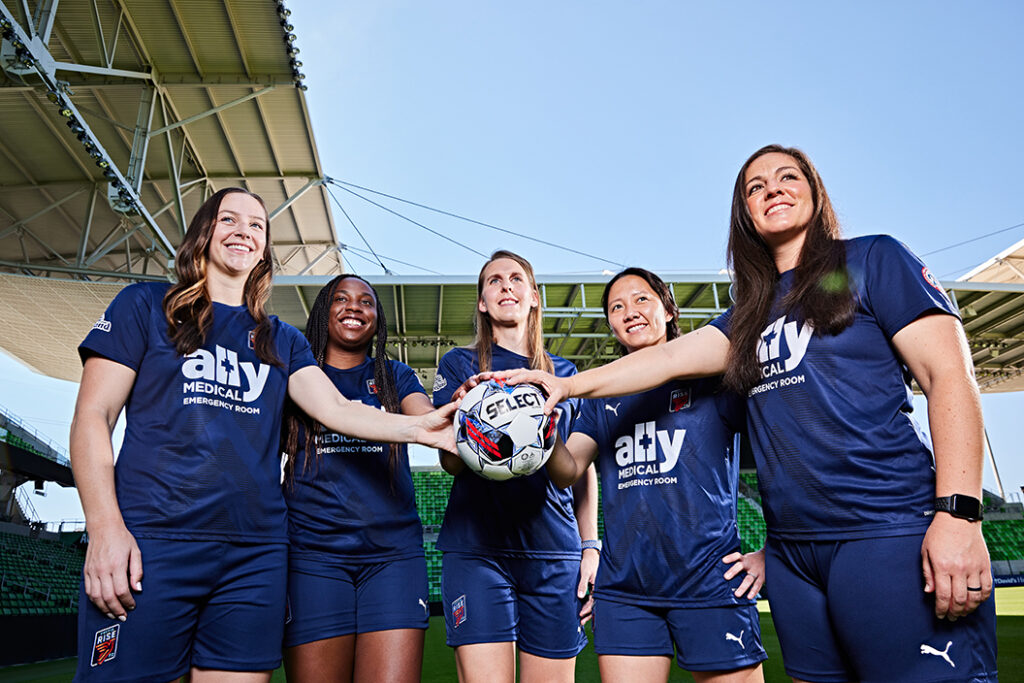
Much like their past, part of that future includes confronting the aspects of the sport that, yet again, they have no control over. Entering the 51st year of Title IX, the stakes couldn’t be higher for those who wish to dedicate their lives to sport, if not at least participate as a means of expression. As of the writing of this article, Gov. Abbott has signed a law banning trans athletes from competing in collegiate sports. As a trans athlete herself, Cyrtmus-Davaul has diligently defended her right and the right of other trans athletes to compete.
“I feel fortunate in terms of how much I’ve been accepted. The different teams or leagues that I became a part of,” she reflects. “Actually I was trying out for the Chicago Red Star reserves team, back when I lived in Chicago. I went to a team meet-and-greet the summer before, and I had met the coach and the assistant coach. We were talking a little bit after tryouts, and he just brought it up. He said, ‘Oh, yeah, I remember talking to you last summer. Actually, after we met, we talked to the whole team about trans athletes, and frankly, everyone was cool with it. It’s not a big deal.’
“In terms of challenges, I actually had just gone to the Capitol a couple of weeks ago to speak against SB 15, which is [a bill]to ban trans athletes from participating in sports of the gender which they identify, in Texas, up to the collegiate level. The biggest challenge is really just misinformation and understanding.
“I’ve been on hormone replacement therapy for six and a half years. And there are people who say that that is a joke and it does nothing,” she reveals. “I would just tell them, ‘Okay, well, you should block your testosterone for a year and take estrogen for a year. Let me know what happens, because you’re going to be surprised.’ It was a very significant impact on my physical abilities. But at the end of the day, that’s part of the challenge of when you’re dealing with youth, kids. There’s so much imbalance and competitive advantage, just because someone went through puberty faster than someone else, that whether someone’s on hormone replacement therapy or not at the youth level should not matter.
“Also, in some states, it’s illegal to even get access to that. So having guidelines that require it for you is pretty intense. When you get to the elite levels of competition. Yes, do your hormone levels matter? They 100% do. But then you’ve got all of these different governing bodies that are creating frameworks so that people can be competing in both a fair and safe way. Even the NCAA, they’ve already changed their guidelines and basically said, ‘Hey, we’re just going to defer to what the national governing bodies do for each sport.’ A ‘one size fits all’ approach for every sport just does not work at all.
“Everyone that was testifying was taking examples of a male that was on testosterone and comparing it to a woman. I was like, ‘You’re not even comparing the right thing here. You have to compare a trans female who’s actually on hormone replacement therapy.’ Fortunately, Austin Rise has been able to connect with many other local LGBTQ organizations and allies through LGBTQ Chamber of Commerce here in Austin. That’s been a great place for us to grow and where we met a number of our sponsors, including our primary sponsor, Ally Medical Emergency Room. We’re women, and we’d love to find other women who support us and vice versa to have a community [and]build those relationships.”
Ageism, transphobia and the ever-eminent presence of potentially career-ending injuries abound. However, the women on this team are made of sterner stuff. At this point in their athletic careers, it’s not about being the best individual. It is, and ultimately always has been, about how to best support the team and, in this case, the organization. How to move forward and ensure that everyone involved is ready to push themselves to their absolute best.
“If you’re newer on the team, or maybe you’re not the best level, that doesn’t matter,” Webb says. “[What matters is] finding your voice on the team. I think that’s something I’ve learned from being on a team. That’s helped in my personal life as well. Being on a team just helps you grow as a leader. Also, when it comes to being a leader, mentoring others to keep that chain going of them becoming leaders as well, creating the future leaders. Something I’ve learned about myself is that you don’t have to be traditional with it either. Just run with it and kind of do it however you want to.”
More than anything, they’ve all come to understand that no one player is bigger than the team. “Recognizing that you’re a part of something bigger, and it’s not about you,” Reed says. “If I can do that, then it’s about driving the team forward, and not myself. I think it’s really easy to get caught up in, ‘Well, I want to do this; I want to score goals; I want to do that.’
“What I’ve actually learned throughout the years in myself is I think I love more when the team succeeds rather than myself. Of course you want the playing time. You want the scoring; you want all those accolades that come with being a star player. But I think what’s even more special is if you can do that, and actually do it in a way that contributes to the team positively and the team winning. I love seeing my teammates be successful. I love seeing my coworkers be successful. If I can help them achieve something that they’re going to achieve, I love that so much more than myself achieving something.”
“We just talked about this as founders,” D’Amico adds. “When I was younger, I always wanted to be captain. I wanted to win the scoring bowl. Wanted to take a penalty kick. I wanted the glory for myself. The older I’ve gotten, and being on these teams, I don’t really care about that. I actually do not want to be captain. Do not want to be the center. I just want to come in, do my job and watch the team succeed. And I get to go to practice and push other people to be better. That sense of community is one thing I’ve gotten out of it. We’re friends. I get to go and have my people. Get to play the game that I love with my people.”
Lisberger notes the sacrifices to ego in order to ensure the team has everything it needs to succeed. “As a younger kid, I felt like it was all about, not necessarily me, but it was like I wanted to win at all costs. As I’ve gotten older, helping to create this team, it’s also about the sacrifices that we’ve all made for each other. Whether it’s the amount of time we’ve spent behind the scenes. It’s the sacrifices we make now to help better the team in the long run.
“As a team, as founders, I feel like we’re making these sacrifices that maybe when we were younger, we may not have wanted to or necessarily even tried to make. As we’re getting older, we’ve realized that we’re building this foundation for these other players so they can play on a team that has the support from the community, the founders, and they know that there will always be a place for them to play.”
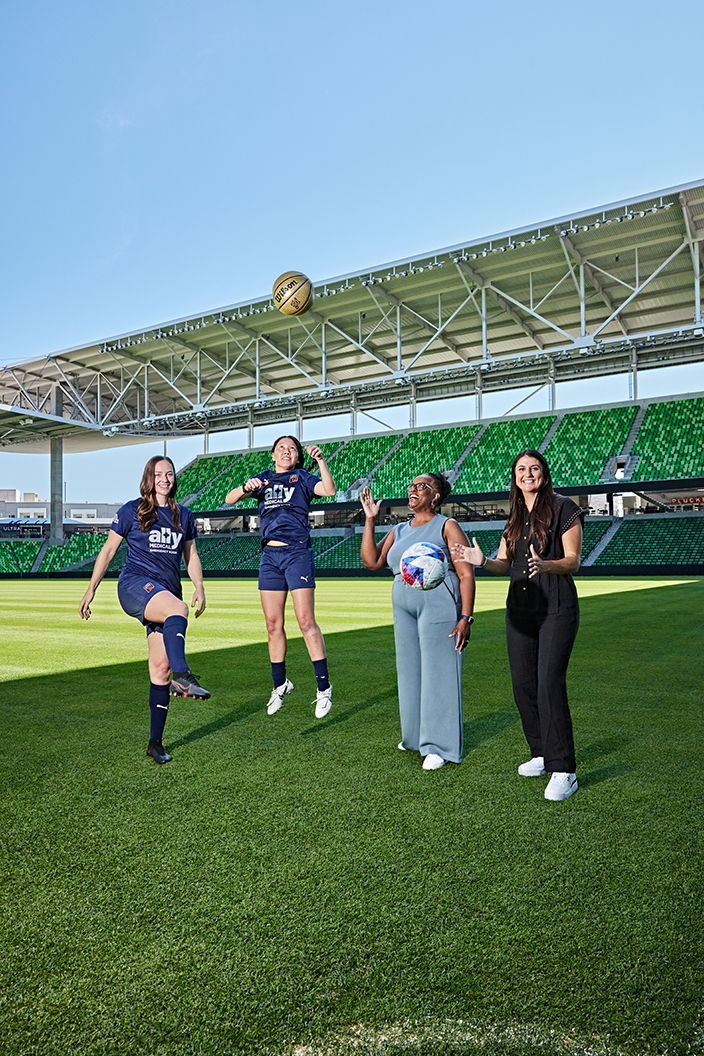
This is what carries this elite team of athletes, warriors, fighters to give their all every single day. From the ashes they emerge, feathers burning bright red, passion emblazoned like hot embers on their sleeves. With an eye ever toward the future, they rise as one.

